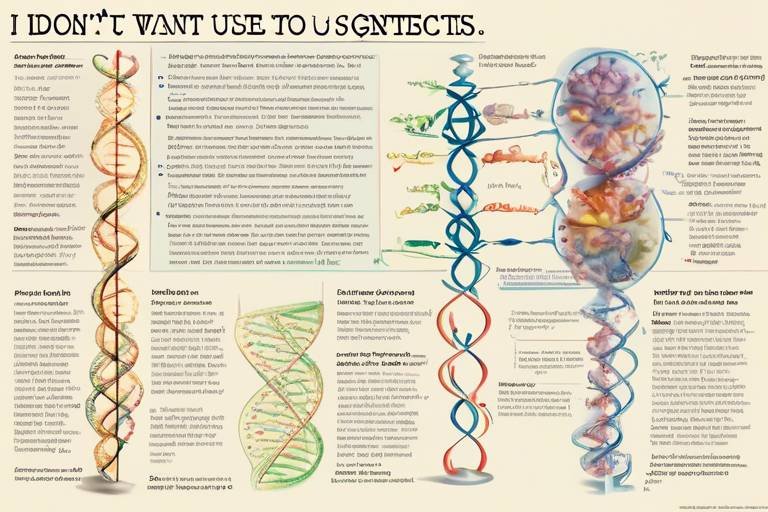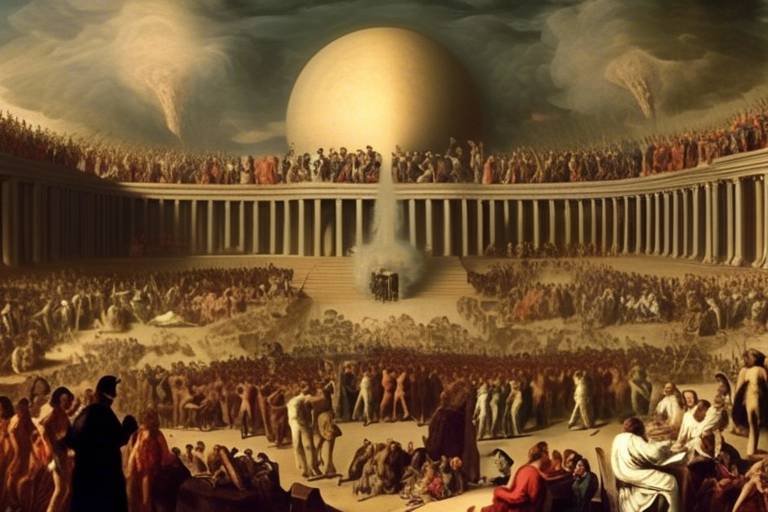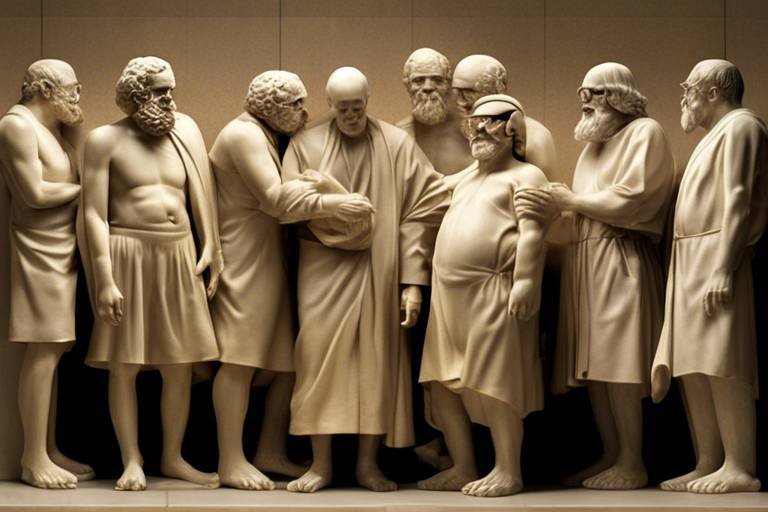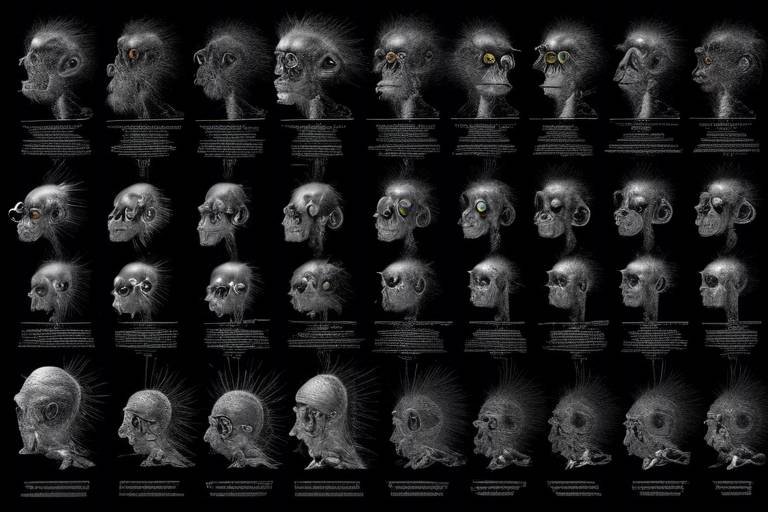Supernatural vs. Natural Science - Philosophical Perspectives
The debate between the supernatural and natural science has captivated thinkers for centuries. At its core, this discussion revolves around how we understand reality and existence. While natural science seeks to explain the universe through empirical evidence and systematic experimentation, the supernatural encompasses beliefs and phenomena that often transcend the physical realm. This article aims to peel back the layers of these two perspectives, exploring their definitions, methodologies, and the philosophical implications that arise from their intersection.
To grasp the essence of this debate, we first need to define what we mean by supernatural and natural science. The supernatural typically refers to entities, forces, or phenomena that exist beyond the observable universe. Think of it as the unseen hand guiding events, like a magician pulling a rabbit out of a hat. In contrast, natural science is grounded in observable phenomena, relying on the scientific method as a means to explore and explain the world around us. It's like shining a flashlight into the dark corners of reality, illuminating what is hidden and allowing us to understand it better.
Understanding these definitions sets the stage for diving deeper into the methodologies employed by natural science. The scientific method is a rigorous process that involves making observations, forming hypotheses, conducting experiments, and drawing conclusions based on the gathered data. This approach allows scientists to build a body of knowledge that is continually refined and expanded. However, it’s important to note that the scientific method is not infallible. It operates under the premise that everything can be tested and measured, which brings us to the limitations of natural science.
In exploring the philosophical implications of both domains, we must ask ourselves: Can the supernatural be reconciled with the findings of natural science? This question is not just academic; it strikes at the heart of human experience and understanding. For many, the supernatural provides a sense of meaning and purpose that natural science, with its focus on the material world, often overlooks. The philosophical discussions surrounding these two areas challenge us to reflect on our beliefs and the nature of existence itself.
In summary, the exploration of supernatural phenomena and natural science is not merely an intellectual exercise; it’s a journey into the very fabric of reality. By examining these perspectives, we can gain insights not only into the universe we inhabit but also into ourselves. As we delve deeper into the methodologies of natural science and the philosophical arguments for and against the supernatural, we begin to see the intricate dance between these two realms, each offering its own unique lens through which to view the world.
- What is the main difference between supernatural and natural science?
The main difference lies in their approaches to understanding reality. Natural science relies on empirical evidence and observation, while the supernatural encompasses beliefs and phenomena that go beyond the observable universe.
- Can natural science explain supernatural phenomena?
Natural science often struggles to explain supernatural phenomena because they typically fall outside the realm of empirical observation and measurement.
- Why do people believe in the supernatural?
Many people turn to the supernatural for answers to existential questions, seeking meaning and purpose that may not be addressed by natural science.
- Is it possible to reconcile natural science with supernatural beliefs?
Some argue that it is possible to find a balance between the two, while others believe they are fundamentally incompatible.

Defining Supernatural and Natural Science
Understanding the fundamental differences between supernatural beliefs and natural science is crucial for exploring their philosophical implications. At first glance, these two domains may seem like they exist in entirely separate realms, but a closer examination reveals a complex interplay that shapes our understanding of reality. So, what exactly do we mean by "supernatural" and "natural science"?
The term supernatural typically refers to phenomena or entities that transcend the laws of nature and are not subject to empirical verification. This can include concepts like deities, spirits, and otherworldly forces. Supernatural beliefs often stem from religious or spiritual traditions, where faith plays a critical role in shaping one’s understanding of existence. In this sense, the supernatural is often seen as a realm that offers answers to questions about meaning, purpose, and the afterlife—questions that science may not be equipped to address.
On the other hand, natural science is grounded in the observable universe. It employs the scientific method, which relies on empirical evidence and systematic experimentation to understand the natural world. Natural science encompasses various disciplines such as physics, chemistry, and biology, each dedicated to unraveling the mysteries of the universe through rigorous testing and observation. The goal here is to establish theories that can be validated or disproven based on evidence, thus providing a more concrete understanding of how things work.
To further clarify, let's break down some key distinctions:
- Nature of Inquiry: Supernatural inquiries often rely on faith and personal experience, while natural science seeks objective truth through observation and experimentation.
- Methodological Approach: Supernatural phenomena are typically examined through philosophical or theological lenses, whereas natural science employs the scientific method.
- Evidence and Verification: Supernatural claims are often not subject to empirical testing, making them challenging to validate. In contrast, natural science thrives on reproducible results and peer review.
These distinctions highlight the contrasting methodologies and epistemologies of supernatural beliefs and natural science. While supernatural perspectives may provide comfort or existential meaning, natural science offers a framework for understanding the physical universe through evidence-based inquiry. However, it’s essential to recognize that both domains can coexist and influence one another, leading to rich philosophical debates about the nature of existence.
In conclusion, defining supernatural and natural science is not merely an academic exercise; it invites us to ponder profound questions about our existence and the universe. As we navigate these complex waters, we must consider how each perspective contributes to our understanding of reality and the implications of embracing one worldview over the other.

The Methodologies of Natural Science
Natural science is not just a collection of facts; it is a rigorous framework that relies on empirical evidence and systematic experimentation to understand the world around us. At its core, natural science is about asking questions, forming hypotheses, conducting experiments, and drawing conclusions based on observable phenomena. This process is encapsulated in what we call the scientific method, a step-by-step approach that has revolutionized our understanding of everything from the tiniest particles to the vastness of the universe.
The scientific method typically involves several key stages: observation, hypothesis formulation, experimentation, and analysis. Let's break this down:
- Observation: This is where it all begins. Scientists observe phenomena in the natural world, which sparks curiosity and leads to questions.
- Hypothesis Formulation: Based on initial observations, scientists propose hypotheses—educated guesses that can be tested.
- Experimentation: This is the heart of natural science. Experiments are designed to test the validity of the hypothesis under controlled conditions.
- Analysis: After conducting experiments, scientists analyze the data to see if it supports or refutes the hypothesis.
Through this rigorous process, natural science has made incredible strides. But what truly sets it apart is its reliance on empirical evidence. Empiricism emphasizes the importance of observation and experience, which means that scientific conclusions must be based on measurable, observable data. This is why you won't find scientists making claims based on anecdotal evidence or personal beliefs; they rely on hard data that can be replicated and verified.
Empiricism is the backbone of the scientific method. It insists that knowledge must be derived from sensory experience. This means that theories in natural science must be grounded in observable phenomena. For example, when studying gravity, scientists don't just theorize about it; they conduct experiments, dropping objects from heights and measuring their fall. This approach ensures that our understanding of natural laws is not just theoretical but based on solid evidence.
To illustrate the power of empirical research, consider the case of the Germ Theory of Disease. In the 19th century, scientists like Louis Pasteur and Robert Koch conducted experiments that demonstrated how microorganisms cause diseases. Their empirical investigations led to groundbreaking advancements in medicine, including sterilization techniques and vaccines, ultimately saving countless lives. This example highlights how empirical research can lead to monumental shifts in understanding and practical applications in the real world.
Another crucial aspect of the scientific method is hypothesis testing. This process involves making predictions based on the hypothesis and then conducting experiments to see if those predictions hold true. For instance, if a scientist hypothesizes that a certain chemical reaction will produce a specific gas, they will set up an experiment to test that prediction. If the experiment confirms the hypothesis, it strengthens the scientific theory; if it refutes it, the hypothesis must be revised or discarded. This iterative process is what allows science to evolve and improve our understanding of the natural world.
Despite its strengths, natural science has its limitations. While it excels at explaining the "how" of the universe—how things work, how they interact—it often falls short in addressing the "why." Questions of meaning, purpose, and existence are often beyond the reach of empirical investigation. For instance, while science can explain the mechanics of love through chemical reactions in the brain, it cannot fully capture the profound human experience of love itself. This limitation invites philosophical inquiry into realms that natural science cannot touch, prompting deeper discussions about the nature of reality and existence.
- What is the scientific method? The scientific method is a systematic approach to inquiry that involves observation, hypothesis formation, experimentation, and analysis of data.
- Why is empiricism important in natural science? Empiricism ensures that scientific conclusions are based on observable and measurable evidence, making them reliable and verifiable.
- What are some limitations of natural science? Natural science primarily addresses the "how" of phenomena and often struggles with questions of meaning and purpose.

Empiricism in Natural Science
When we dive into the realm of natural science, we quickly encounter the concept of empiricism, which serves as its backbone. Empiricism is the philosophical stance that emphasizes knowledge derived from experience and observation. Think of it as a detective's magnifying glass, allowing scientists to scrutinize the world around them. This approach is not just a method; it's a way of thinking that prioritizes what can be seen, measured, and tested. In a world filled with theories and speculations, empiricism stands tall as a beacon of clarity, guiding scientists toward a more grounded understanding of reality.
At its core, empiricism posits that all knowledge must be rooted in observable phenomena. This means that for a scientific claim to hold weight, it must be substantiated by data collected through rigorous experimentation and observation. Imagine trying to build a house without a blueprint; that’s what forming scientific conclusions without empirical evidence feels like. The scientific method, which is a structured approach to inquiry, inherently relies on this principle. It comprises several steps, including observation, hypothesis formation, experimentation, and conclusion, all aimed at ensuring that conclusions are based on solid ground.
Empirical data is the lifeblood of scientific inquiry. It comes from various sources, including
- Field studies
- Laboratory experiments
- Surveys and observational studies
One of the most fascinating aspects of empiricism is its adaptability. As new technologies emerge, they enhance our ability to gather and analyze empirical data. Take, for example, the advent of telescopes and microscopes. These tools have revolutionized our understanding of the universe, allowing scientists to observe phenomena that were once beyond our reach. The discovery of the structure of DNA and the exploration of distant galaxies are testaments to how empirical methods can push the boundaries of knowledge.
However, it's essential to acknowledge that empiricism is not without its challenges. While it excels in explaining how things work, it often falls short in addressing questions of meaning and purpose. For instance, while we can measure the chemical reactions in a living organism, understanding the essence of life itself remains a philosophical quandary. This limitation invites a broader discussion about the intersection of science and philosophy, prompting us to consider what lies beyond the observable.
In summary, empiricism is a cornerstone of natural science, grounding scientific inquiry in observation and experience. It shapes our understanding of the world and encourages a systematic approach to exploring the unknown. While it provides invaluable insights, it also highlights the importance of philosophical inquiry, reminding us that some questions may never be fully answered by empirical methods alone.
- What is empiricism? Empiricism is a philosophical theory that emphasizes knowledge gained through experience and observation.
- How does empiricism relate to natural science? Empiricism forms the foundation of natural science by ensuring that scientific claims are based on observable and measurable evidence.
- What are some methods of empirical research? Common methods include field studies, laboratory experiments, and surveys.
- What are the limitations of empiricism? While empiricism is effective in explaining natural phenomena, it often struggles to address questions of meaning and purpose.

Case Studies in Empirical Research
When we think about empirical research in natural science, it’s essential to look at real-world examples that illustrate its power and effectiveness. One of the most renowned cases is the study of penicillin by Alexander Fleming. In 1928, Fleming noticed that a mold called Penicillium notatum had contaminated one of his petri dishes, and surprisingly, the bacteria surrounding the mold were dying. This observation led to the discovery of penicillin, a groundbreaking antibiotic that has saved countless lives. This case exemplifies how keen observation and an open mind can lead to revolutionary scientific breakthroughs.
Another compelling example is the Galileo’s observations of celestial bodies. Using a telescope, Galileo made meticulous observations of Jupiter's moons, challenging the long-held geocentric model of the universe. His empirical evidence supported the heliocentric theory proposed by Copernicus, which stated that the Earth and other planets revolve around the Sun. This pivotal moment in science not only changed our understanding of the universe but also laid the groundwork for modern astronomy.
Furthermore, the study of climate change illustrates the importance of empirical research in addressing global challenges. Scientists have gathered extensive data through satellite imagery, ice core samples, and temperature records, providing a robust basis for understanding the changes in our climate. The empirical evidence collected over decades has led to significant conclusions about human impact on the environment, influencing global policies and awareness about climate action.
In these examples, we see how empirical research operates not just in isolation but as part of a larger conversation within the scientific community. Each study builds on previous knowledge, creating a tapestry of understanding that evolves over time. The beauty of empirical research lies in its ability to adapt and refine theories based on new evidence, ensuring that science remains a dynamic and self-correcting process.
To further illustrate the impact of empirical research, let’s look at a brief summary of key case studies:
| Case Study | Researcher(s) | Year | Significance |
|---|---|---|---|
| Penicillin Discovery | Alexander Fleming | 1928 | Revolutionized medicine with antibiotics. |
| Galileo's Celestial Observations | Galileo Galilei | 1610 | Supported heliocentric theory, changing astronomy. |
| Climate Change Studies | Various Scientists | Ongoing | Informed global policies on environmental issues. |
These case studies not only highlight the effectiveness of empirical research but also demonstrate how scientific inquiry can lead to profound changes in our understanding of the world. By relying on observation and evidence, scientists can challenge existing beliefs and push the boundaries of knowledge. So, the next time you hear about a new scientific discovery, remember the rigorous processes and empirical foundations that made it possible!
- What is empirical research? Empirical research is a way of gaining knowledge by means of direct or indirect observation or experience.
- Why is empirical evidence important in science? Empirical evidence is crucial because it helps validate theories and claims, ensuring that scientific knowledge is based on observable phenomena.
- Can empirical research be subjective? While empirical research aims to be objective, the interpretation of data can sometimes introduce subjectivity.

The Role of Hypothesis Testing
Hypothesis testing is a pivotal aspect of the scientific method, acting as a bridge between theory and empirical evidence. In essence, it allows scientists to make informed decisions about the validity of their ideas. When we formulate a hypothesis, we are essentially making a guess based on existing knowledge. This guess is then rigorously tested through experimentation and observation. But why is this process so crucial? Well, it helps to sift through the noise of countless possibilities and focus on what can be substantiated with real data.
To break it down further, hypothesis testing can be seen as a systematic approach to understanding the universe. It involves several key steps:
- Formulation of a Hypothesis: This is where the journey begins. A hypothesis is a testable statement about the relationship between two or more variables.
- Experimentation: Here, scientists design experiments to collect data that will either support or refute the hypothesis. This step often requires creativity and meticulous planning.
- Analysis: Once data is collected, it undergoes statistical analysis to determine if the results are significant enough to draw conclusions.
- Conclusion: Finally, based on the analysis, scientists either reject or fail to reject the hypothesis, contributing to a broader understanding of the subject matter.
This structured approach not only strengthens scientific claims but also fosters a culture of skepticism and inquiry. By demanding evidence before accepting a hypothesis, science ensures that beliefs are grounded in reality rather than conjecture. This is particularly significant in a world where misinformation can spread like wildfire. A robust hypothesis testing framework acts as a safeguard against accepting unverified claims.
However, it's important to note that hypothesis testing is not without its challenges. For instance, the results can sometimes be misleading due to factors such as sample size or experimental bias. Scientists must remain vigilant and critical, always questioning their methods and outcomes. This self-reflective nature of science is what drives progress and innovation.
In summary, the role of hypothesis testing in natural science cannot be overstated. It is the mechanism through which ideas are rigorously evaluated, ultimately leading to a deeper understanding of the natural world. As we continue to explore and expand our knowledge, hypothesis testing remains a cornerstone of scientific inquiry, ensuring that our understanding of reality is continually refined and updated.
- What is a hypothesis? A hypothesis is a testable prediction about the relationship between variables in a study.
- Why is hypothesis testing important? It provides a structured method for validating or refuting scientific claims, ensuring that conclusions are based on empirical evidence.
- Can a hypothesis be proven true? No, a hypothesis can only be supported or rejected based on experimental evidence; it cannot be proven true in an absolute sense.
- What are common pitfalls in hypothesis testing? Common pitfalls include small sample sizes, bias in data collection, and misinterpretation of results.

Limitations of Natural Science
While natural science has undoubtedly revolutionized our understanding of the universe, it is essential to recognize its limitations. One of the most significant constraints is its inability to address questions of meaning and purpose. For instance, while science can explain the how of phenomena—such as why the sky is blue or how gravity works—it often falls short in addressing the why. Why do we exist? What is the purpose of life? These profound questions tend to lie outside the purview of empirical investigation.
Moreover, natural science is fundamentally based on observable phenomena. This reliance on observation means that anything deemed supernatural—by definition, beyond the natural world—is often dismissed outright. This exclusion can lead to a skewed interpretation of reality, where only what can be measured and tested is considered valid. For example, concepts like love, morality, and consciousness are challenging to quantify, yet they play a significant role in human experience.
Another limitation stems from the scientific method, which, while robust, is not infallible. Scientific theories are subject to change based on new evidence, which is a strength in terms of adaptability but also a weakness when it comes to providing definitive answers. Theories such as the phlogiston theory of combustion or the ether theory of light were once widely accepted but later disproven. This highlights the notion that scientific understanding is provisional, raising the question: how can we trust conclusions that may be overturned in the future?
Furthermore, the focus on quantitative data often overlooks qualitative aspects of human experience. For instance, the richness of human emotions, the depth of spiritual experiences, and the nuances of ethical dilemmas can’t always be captured through numbers or statistical analysis. This limitation can lead to a fragmented view of reality, where essential human experiences are marginalized or ignored.
In addition, natural science can sometimes foster a sense of determinism, suggesting that everything can be explained through physical laws and processes. This worldview can diminish the sense of human agency and free will. If every action can be predicted based on prior conditions, where does that leave our sense of choice and moral responsibility? This philosophical dilemma illustrates another area where natural science may fall short.
Lastly, the limitations of natural science also extend to the scope of inquiry. There are phenomena that, while intriguing, may not be amenable to scientific investigation at all. Take, for example, the experience of mystical or transcendent states. These experiences can profoundly affect individuals but often elude scientific scrutiny. Thus, while natural science is a powerful tool for understanding the natural world, it is not the only lens through which to view existence.
In summary, the limitations of natural science highlight the importance of a more holistic approach to understanding reality. By acknowledging these constraints, we open the door to a richer exploration of existence that encompasses not just the measurable but also the immeasurable aspects of life.
- What are the main limitations of natural science?
Natural science is limited in addressing questions of meaning and purpose, relies heavily on observable phenomena, and may overlook qualitative aspects of human experience. - Can science explain everything?
No, science cannot explain everything, especially subjective experiences like emotions and spirituality that do not lend themselves to empirical measurement. - How does the scientific method impact our understanding of reality?
The scientific method provides a systematic approach to inquiry, but its provisional nature means that our understanding of reality is always evolving.

Philosophical Perspectives on the Supernatural
When diving into the philosophical perspectives on the supernatural, we enter a realm where beliefs and reasoning intertwine, often leading to heated debates and profound insights. The supernatural encompasses phenomena that are beyond the natural world, often invoking the divine, mystical, or unexplained. Philosophers have long grappled with the implications of these beliefs, questioning their validity and relevance in a world increasingly dominated by scientific inquiry. This discourse is not merely academic; it touches on our deepest existential questions: What is the nature of reality? Is there a higher power? And how do we reconcile our experiences with the tangible world around us?
One of the central themes in this philosophical landscape is the argument from design. This argument suggests that the intricate complexity of the universe implies the existence of a designer, much like a watch implies a watchmaker. Proponents of this view argue that the precision and order we observe in nature cannot be mere products of chance. They point to examples such as the delicate balance of ecosystems, the laws of physics, and even the intricacies of human consciousness as evidence of a purposeful creation. However, this perspective is not without its critics. Many in the scientific community argue that natural processes, such as evolution and natural selection, can explain the complexity we observe without invoking a supernatural designer.
Furthermore, the debate often contrasts naturalism and supernaturalism. Naturalism posits that everything arises from natural properties and causes, and supernatural explanations are either nonexistent or irrelevant. On the other hand, supernaturalism embraces the idea that there are forces beyond our understanding that can influence the natural world. This dichotomy raises critical questions about the nature of existence and reality. For instance, if one subscribes to naturalism, how do they account for experiences that seem inexplicable by natural laws? Conversely, how do supernaturalists justify their beliefs in light of overwhelming empirical evidence supporting naturalistic explanations?
As we explore these philosophical perspectives, we must also consider the implications of our beliefs on our understanding of existence. The supernatural often provides comfort and meaning, offering explanations for life's mysteries and challenges. In contrast, natural science encourages a more skeptical and questioning approach, urging us to seek evidence and understanding through observation and experimentation. This tension between belief and skepticism is a hallmark of human thought, leading to a rich tapestry of philosophical inquiry.
In summary, the philosophical perspectives on the supernatural challenge us to reflect on our beliefs and the nature of reality. Whether one leans towards naturalism or supernaturalism, the discussions surrounding these topics are vital for our understanding of existence. They encourage us to ask questions, seek knowledge, and ultimately, strive for a deeper understanding of the world we inhabit.
- What is the main difference between naturalism and supernaturalism?
Naturalism asserts that everything arises from natural properties and causes, while supernaturalism believes in forces beyond natural explanations. - What is the argument from design?
The argument from design suggests that the complexity of the universe implies a designer, similar to how a watch implies a watchmaker. - How do philosophers view the supernatural?
Philosophers debate the existence and implications of supernatural phenomena, often contrasting them with naturalistic explanations.

The Argument from Design
The Argument from Design is a philosophical viewpoint that suggests the intricate complexity and order of the universe imply the existence of an intelligent designer. Imagine walking through a forest and stumbling upon a beautifully crafted watch lying on the ground. Your immediate reaction might be to conclude that such a complex object could not have come about by mere chance; it must have been created by someone. This analogy reflects the essence of the design argument, positing that just as a watch implies a watchmaker, the universe's complexity implies a universe-maker.
This argument has gained traction in various philosophical and theological discussions, particularly in the context of natural theology. Proponents assert that the remarkable order found in nature—from the precise laws of physics to the intricate systems of biology—cannot be adequately explained by random chance or natural processes alone. They argue that such complexity suggests a purposeful creation, often attributing this to a divine being or higher power.
However, the Argument from Design is not without its critics. Many scientists and philosophers argue that natural processes, such as evolution and natural selection, provide robust explanations for the complexity observed in the natural world. For instance, the theory of evolution demonstrates how simple organisms can develop into more complex forms over millions of years through gradual changes and adaptations. Critics of the design argument often point out that invoking a designer does not necessarily provide a satisfactory explanation for the existence of complexity; it may simply push the question back a step without resolving it.
To further illustrate the debate, consider the following table that outlines key points for and against the Argument from Design:
| Support for Design Argument | Critiques of Design Argument |
|---|---|
| Complexity of the universe suggests intentional creation. | Natural processes can explain complexity without invoking a designer. |
| Order in nature points to a purposeful creator. | Evolutionary theory provides a framework for understanding biological complexity. |
| Philosophical implications of design align with many religious beliefs. | Design arguments can lead to the 'God of the gaps' fallacy, where gaps in knowledge are filled with divine explanations. |
Ultimately, the Argument from Design raises profound questions about existence and reality. Is the universe merely a product of random chance, or does it reflect the handiwork of an intelligent designer? This debate not only influences philosophical discourse but also impacts how individuals perceive their place in the cosmos. As we navigate through these complex ideas, we find ourselves grappling with the very essence of what it means to exist and understand our reality.
- What is the Argument from Design? The Argument from Design suggests that the complexity and order of the universe imply the existence of an intelligent designer.
- How does the Argument from Design relate to science? While the argument posits a creator, many scientists argue that natural processes, such as evolution, can adequately explain complexity without invoking a designer.
- What are some criticisms of the Argument from Design? Critics point out that it may lead to the 'God of the gaps' fallacy and that complex systems can arise from natural processes.

Naturalism vs. Supernaturalism
When we delve into the realms of naturalism and supernaturalism, we're not just exploring two opposing philosophies; we're embarking on a journey through the very fabric of our understanding of existence. Naturalism, at its core, is the belief that everything arises from natural properties and causes, and supernatural explanations are excluded or discounted. Essentially, it asserts that the universe operates under consistent laws that can be observed, tested, and understood through scientific inquiry. Imagine a world where every phenomenon, from the smallest particle to the vast cosmos, can be explained through natural laws. This is the playground of naturalists, where curiosity fuels exploration and evidence reigns supreme.
On the flip side, we have supernaturalism, which embraces the idea that there are forces beyond the natural world that influence or govern our reality. This perspective often invokes the existence of deities, spirits, or otherworldly entities that cannot be measured or observed through scientific methods. Think of supernaturalism as the canvas where miracles, divine interventions, and mystical experiences paint a picture that transcends the mundane. It's a worldview that invites wonder and mystery, challenging the strict boundaries that naturalism sets.
To better understand the distinctions between these two philosophies, let's consider some key points:
| Aspect | Naturalism | Supernaturalism |
|---|---|---|
| Definition | Belief in a reality explained by natural laws. | Belief in forces beyond the natural world. |
| Methodology | Empirical evidence and scientific methods. | Faith, revelation, and personal experience. |
| View on Existence | Everything can be understood through science. | Existence includes both natural and supernatural elements. |
| Examples | Evolution, physics, chemistry. | Miracles, divine creation, spiritual experiences. |
The implications of these contrasting views extend beyond mere definitions. For instance, naturalism tends to foster a sense of responsibility towards the environment and society, as it emphasizes the interconnectedness of all living things within a natural framework. In contrast, supernaturalism may lead to a reliance on divine intervention, which can sometimes diminish personal accountability. This divergence raises intriguing questions: Does believing in a higher power absolve individuals of their responsibilities? Or does a naturalistic worldview compel us to act ethically because we are all interconnected?
Moreover, the clash between naturalism and supernaturalism often manifests in debates surrounding morality, purpose, and the meaning of life. Naturalists argue that moral values can be derived from human experiences and social contracts, while supernaturalists might contend that morality is grounded in divine commands or a higher moral order. This philosophical tug-of-war invites us to reflect on profound questions about our existence: Are we simply products of evolution, or is there a greater purpose to our lives?
Ultimately, the discourse surrounding naturalism and supernaturalism is not merely academic; it profoundly influences our worldview, our actions, and our understanding of reality. Whether one leans towards the empirical rigor of naturalism or the awe-inspiring mysteries of supernaturalism, both perspectives enrich our exploration of existence. They challenge us to consider not only what we believe but why we believe it, igniting a spark of curiosity that drives the human experience.
- What is the main difference between naturalism and supernaturalism? Naturalism focuses on natural explanations for phenomena, while supernaturalism includes beliefs in forces beyond the natural realm.
- Can naturalism and supernaturalism coexist? While they are often seen as opposing views, some individuals may integrate aspects of both into their personal beliefs.
- How do naturalists explain morality? Naturalists often argue that morality is a social construct derived from human experiences and interactions.
- What role does empirical evidence play in naturalism? Empirical evidence is fundamental to naturalism, as it relies on observation and experimentation to form conclusions about the natural world.
Frequently Asked Questions
- What is the main difference between supernatural phenomena and natural science?
The main difference lies in their foundational approaches. Supernatural phenomena are often based on beliefs that transcend the natural world, relying on faith or spiritual interpretations. In contrast, natural science is grounded in empirical evidence, systematic experimentation, and the scientific method, focusing on observable and measurable aspects of the universe.
- How does the scientific method contribute to our understanding of the natural world?
The scientific method is a structured approach that involves observation, hypothesis formulation, experimentation, and analysis. This method allows scientists to test theories and gather data, leading to conclusions that can be replicated and validated. It’s like a detective solving a mystery—gathering clues, forming theories, and testing them until the truth is revealed.
- What role does empiricism play in natural science?
Empiricism is the backbone of natural science, emphasizing that knowledge comes from sensory experience and observation. It’s through empirical data that scientists form hypotheses and build theories. Imagine trying to bake a cake without tasting it; you wouldn’t know if it’s good or not! Similarly, empirical evidence is essential for validating scientific claims.
- Are there limitations to what natural science can explain?
Yes, natural science has its limitations, particularly when it comes to existential questions about meaning and purpose. While it excels at explaining the mechanics of the universe, it often falls short in addressing deeper philosophical inquiries. Think of it like a map—it can show you the terrain but not the feelings or experiences tied to those places.
- What is the argument from design, and how does it relate to supernatural beliefs?
The argument from design suggests that the complexity and order of the universe imply the existence of a designer, often interpreted as a supernatural being. This philosophical perspective challenges natural science by asserting that not everything can be explained through empirical means. It’s akin to finding a beautifully crafted watch and assuming it must have a watchmaker—this sparks debate about the origins of complexity in nature.
- How do naturalism and supernaturalism differ in their worldviews?
Naturalism posits that everything arises from natural properties and causes, rejecting supernatural explanations. On the other hand, supernaturalism embraces the idea that beyond the natural world, there are forces or entities that influence reality. It’s like looking at a painting: a naturalist sees only the colors and brushstrokes, while a supernaturalist may ponder the artist’s intent and inspiration behind the work.



















